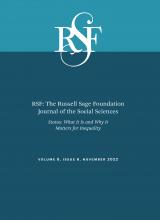Abstract
Status, a form of inequality based on esteem, respect, and honor, pervades social life but is poorly understood and underestimated in terms of significance. We offer a new look at status as a dynamic relationship between the shared views of others and the self that organizes behavior at the micro, meso, and macro levels of society. The status process is governed by a taken-for-granted sociocultural schema consisting of implicit norms for allocating status based on the perceived value of the individual to the group, as well as on historically changing status beliefs about what types of people are more worthy and competent than others. Status plays a role as a powerful motive for individual and group action and in the construction of durable patterns of inequality based on social differences such as race and gender. The pernicious effects of status processes can be mitigated by undermining status beliefs, stereotypes, and norms.
- © 2022 Russell Sage Foundation. Ridgeway, Cecilia L., and Hazel Rose Markus. 2022. “The Significance of Status: What It Is and How It Shapes Inequality.” RSF: The Russell Sage Foundation Journal of the Social Sciences 8(6): 1–25. DOI: 10.7758/RSF.2022.8.6.01. The authors would like to thank Amrita Maitreyi for producing figure 1 for us. Direct correspondence to: Cecilia L. Ridgeway, at ridgeway{at}stanford.edu, Department of Sociology, Stanford University, 450 Jane Stanford Way, Building 120, Stanford, CA 94305, United States; Hazel Rose Markus, at hmarkus{at}stanford.edu, Department of Psychology, Stanford University, 450 Jane Stanford Way, Building 420, Stanford, CA 94305, United States.
Open Access Policy: RSF: The Russell Sage Foundation Journal of the Social Sciences is an open access journal. This article is published under a Creative Commons Attribution-NonCommercial-NoDerivs 3.0 Unported License.






